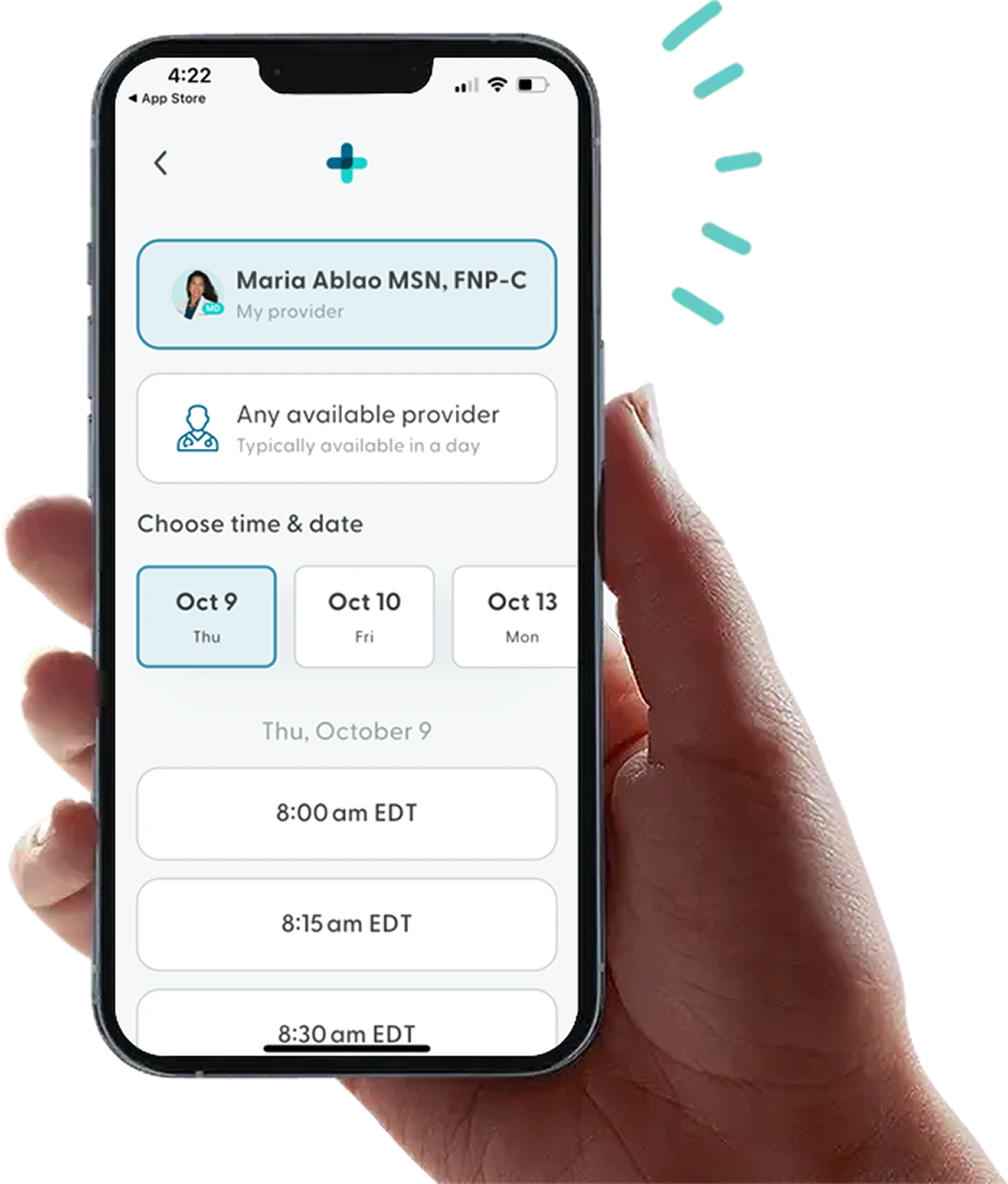Can You Get Genital Herpes from Kissing?
What is Herpes?
Herpes is a condition caused by the herpes simplex virus (HSV). It is typically regarded as a sexually transmitted infection (STI), but it can also be spread via nonsexual contact with saliva or fluid from the sore of an infected person.
The herpes simplex virus is divided into 2 types: HSV-1 and HSV-2. Both of these viruses are responsible for the painful blistering rash typically found on the mouth, anus, or genitals.
Usually, oral herpes is caused by HSV-1 while HSV-2 causes genital herpes. However, either virus can cause a herpes outbreak in either part of the body.
Take control of your sexual health today!
Don't wait. Schedule a confidential online consultation with an experienced medical professional.


Is Herpes Curable?
Herpes is a chronic disease with no cure and it is often referred to as a chronic relapsing condition. Infection can therefore either be primary (first infection) or recurrent (reactivation/outbreak).
Primary infection
Primary infection occurs when an uninfected individual comes into contact with HSV sores or blisters.
The virus affects the skin and nerves at the infection site, causing pain and blisters. HSV then replicates and sets up infection deep within the nerve.
Eventually, the body heals on the surface. A person may then have no visible symptoms of the herpes infection, but they may still have the virus which can reactivate at any time.
Recurrent herpes
Certain triggers can periodically cause the virus to reactivate and travel down the nerve, causing blisters in the same spot as the first infection — this is known as recurrent herpes.
Herpes typically only affects the same site, but it is possible to infect yourself at different sites if you touch or scratch a blister and then touch another part of your body. This is called autoinoculation or self-inoculation.
Some reactivation triggers include:
UV light (e.g. sunlight)
Hormonal changes (e.g. the menstrual cycle)
Fever (oral infection sometimes called “fever blisters”)
Psychological stress
What are the Differences Between Genital (HSV-2) and Oral Herpes (HSV-1)?
Genital herpes is usually caused by HSV-2 and infection typically occurs in adulthood when individuals become sexually active. There may be no obvious symptoms with HSV-2.
Oral herpes is caused by HSV-1 and exposure to the virus is common — it can be spread through contact with cold sores, saliva, and contaminated surfaces. The transmission risk is greatest when active sores are visible.
Is it Possible to Contract Genital Herpes from Kissing?
It is not possible to contract genital herpes from kissing.
HSV virus particles need to be spread from blisters (either visible or not) and fluids infected with the particles.
To contract genital herpes, you’d need to come into contact with fluid from a sore in the genital or anal area. You can, however, contract oral herpes from kissing.
Some factors that increase your chances of getting oral herpes from kissing include:
HIV-coinfection (being infected with herpes as well as HIV)
Open sores and blisters
Damaged skin
Burns
Skin conditions like eczema
What type of kiss can spread herpes?
Herpes can spread via any kind of kiss where sores — or fluid containing virus particles from sores — make contact with broken skin or mucous membranes of another person.
Intact skin is resistant to the virus, but may still be infected. You can also be infected with herpes by touching the saliva of an infected person.
How Do HSV-1 and HSV-2 Spread?
There are two main ways herpes can spread.
Direct contact with virus particles
HSV-1 or HSV-2 is usually spread by direct contact with virus-containing sores or ulcers.
This can either occur between individuals, or infect the same individual on a different part of their body (autoinoculation). Fluids containing virus particles can also spread the disease.
From mother to child
A mother infected with herpes (either with primary or recurrent herpes) can also spread the disease to her child. This is much more common in the primary stage of infection as the mother hasn’t produced antibodies yet.
The fetus, therefore, does not have any antibodies to resist the herpes infections. During childbirth, herpes can be spread to the infant from direct contact with sores in the birth canal.
What is the Link Between HSV-2 and HIV?
Individuals who have both HSV and HIV, are more likely to transmit HIV.
This is due to HSV-2 increasing the amount of HIV particles in the blood. Herpes sores also tend to ulcerate and weep in HIV-infected individuals — this spreads infected fluid, making it easier to transmit HIV.
How to Prevent the Transmission of Herpes
You can protect yourself from oral and genital herpes by following the guidelines below:
Do not have unprotected sex with those infected with herpes
Use barrier protection, such as condoms
Take your antiviral medications as required
Manage all other sexually transmitted infections
If you have HIV, take your ARVs (antiretroviral medications) as prescribed
Disclose your status to your partner so that they can take appropriate preventative measures
Ensure all open wounds have healed before resuming sexual activities
Where Can I Learn More About Genital Herpes?
Do you need genital herpes treatment? LifeMD can help.
Join LifeMD today to get 24/7 access to healthcare providers — plus same-day prescriptions when you need them.
More articles like this
Feel better with LifeMD.
Your doctor is online and ready to see you.
Join LifeMD for seamless, personalized care — combining expert medical guidance, convenient prescriptions, and 24/7 virtual access to urgent and primary care.

 Medically reviewed and edited by
Medically reviewed and edited by 











